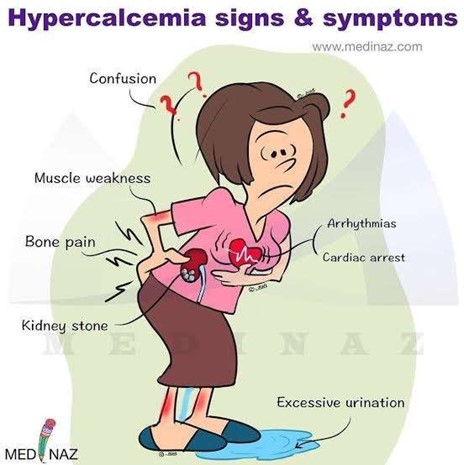A client is diagnosed with hypercalcemia.
Which of the following clinical manifestations would the nurse expect to observe (Select all that apply).
Muscle spasms.
Confusion.
Constipation.
Bradycardia.
Polyuria.
Correct Answer : B,C,D
Hypercalcemia is a condition in which the calcium level in the blood is above normal.

This can cause various symptoms, such as confusion, constipation, and bradycardia (slow heart rate).
These are the clinical manifestations that the nurse would expect to observe in a client with hypercalcemia.
Choice A is wrong because muscle spasms are not a common symptom of hypercalcemia.
In fact, hypercalcemia can cause muscle weakness and pain.
Choice E is wrong because polyuria (excessive urination) is not a direct symptom of hypercalcemia, but rather a result of kidney problems caused by hypercalcemia.
Hypercalcemia can make the kidneys work harder to filter the excess calcium, leading to dehydration and thirst.
However, this does not necessarily mean that the client will have polyuria.
Normal ranges for calcium levels in the blood are 8.5 to 10.2 mg/dL (milligrams per deciliter) or 2.1 to 2.6 mmol/L (millimoles per liter).
Nursing Test Bank
Naxlex Comprehensive Predictor Exams
Related Questions
Correct Answer is D
Explanation
Monitoring the client’s electrolyte levels before and after the treatment. This is because acute kidney injury (AKI) can cause electrolyte imbalances such as hyperkalemia, hyperphosphatemia, hypocalcemia, and metabolic acidosis. Hemodialysis can help correct these imbalances by removing excess fluid and waste products from the blood. However, hemodialysis can also cause electrolyte shifts and complications such as hypotension, muscle cramps, and arrhythmias. Therefore, it is important to monitor the client’s electrolyte levels before and after the treatment to assess the effectiveness and safety of hemodialysis.
Choice A is wrong because monitoring the client’s blood pressure every 4 hours is not frequent enough during hemodialysis.
Hemodialysis can cause rapid changes in blood pressure due to fluid removal and vascular access.
Therefore, blood pressure should be monitored more often, such as every 15 to 30 minutes during hemodialysis.
Choice B is wrong because administering a loop diuretic before the treatment is not indicated for AKI patients receiving hemodialysis.
Loop diuretics are used to increase urine output and reduce fluid overload in AKI patients who have some residual kidney function.
However, hemodialysis can achieve the same goal by removing excess fluid from the blood.
Moreover, loop diuretics can cause electrolyte depletion and ototoxicity, which can worsen the condition of AKI patients.
Choice C is wrong because assessing the client’s respiratory status every 2 hours is not specific enough for hemodialysis treatment.
Hemodialysis can affect respiratory mechanics by altering fluid balance, acid- base status, and oxygen delivery.
Therefore, respiratory status should be assessed more frequently and comprehensively during hemodialysis, such as by measuring respiratory rate, oxygen saturation, arterial blood gas, and chest auscultation.
Correct Answer is A
Explanation
The correct answer is choice A. Daily weight.

According to MDCalc, daily weight is the most accurate indicator of fluid loss or gain in acutely ill patients, as it reflects changes in total body water.
A weight change of 1 kg corresponds to a fluid change of approximately 1 L.
Choice B is wrong because intake and output measurements can be inaccurate or incomplete, and do not account for insensible fluid losses.
Choice C is wrong because serum osmolality reflects the concentration of solutes in the blood, not the volume of fluid.
Choice D is wrong because urine specific gravity reflects the concentration of solutes in the urine, not the volume of fluid.
Whether you are a student looking to ace your exams or a practicing nurse seeking to enhance your expertise , our nursing education contents will empower you with the confidence and competence to make a difference in the lives of patients and become a respected leader in the healthcare field.
Visit Naxlex, invest in your future and unlock endless possibilities with our unparalleled nursing education contents today
Report Wrong Answer on the Current Question
Do you disagree with the answer? If yes, what is your expected answer? Explain.
Kindly be descriptive with the issue you are facing.
